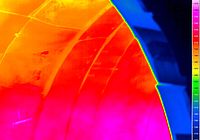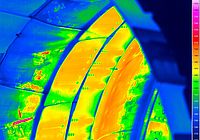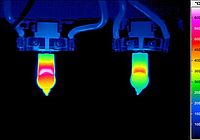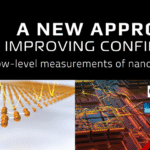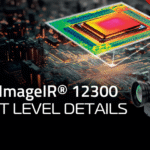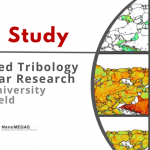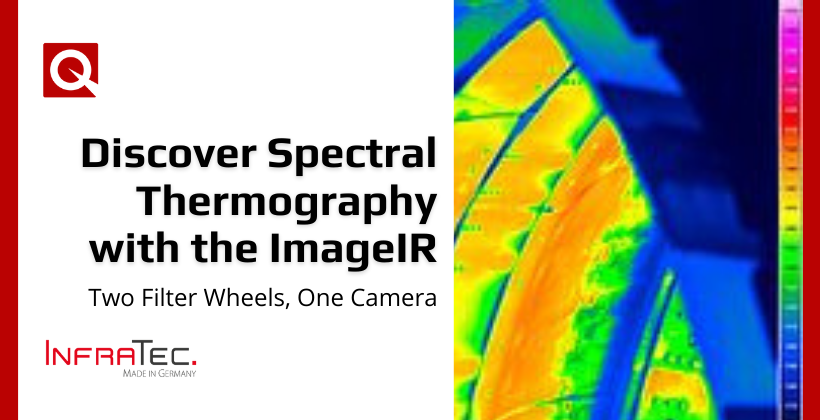
Spectral thermography provides material specific precision measurements
- Concentrate measurements on highly emissive or transmissive spectral ranges
- Thermal imaging of gases and flames as well as on glass and through glass with spectral filters
- Filters close to the detector of the infrared camera avoid warm aperture effects
Rotating Filter and Aperture Wheel of the ImageIR® Camera Series
Adaptation of the Camera to the Spectral Characteristics of the Object
The design of the ImageIR® thermographic camera enables the implementation of up to two rotating filter wheels and rotating aperture wheels, which can be controlled independently. The two motorised wheels allow up to 30 filter /aperture combinations, which can be fitted individually. The selection of the desired combination of the two wheels is completely remotely controllable from the corresponding menu of the camera operating software IRBIS® online.
The combination of separate rotating filter and aperture wheel positions is the prerequisite for universal use for measuring tasks in the spectral thermography sector. Spectral filters can be used to adapt the sensitivity range of the camera to the specific spectral characteristics of the measured objects, for example:
- Optimised measurement of the surface temperature of shining metals, glass, plastics and other materials
- Measurement of objects behind glass, gases or flames
- Capturing flames and gases

“InfraTec’s ImageIR series allows the combination of two filter wheels. This opens up the field of spectral thermography for thermographic measurement of different materials and processes and also high dynamic range (HDR) measurements with neutral density filters. With the ImageIR you can really customise the camera to your application.”
Dr. Luke Nicholls, Technical Sales Engineer, Quantum Design UK and Ireland
To learn more and ask questions about your application or research area, get in touch with Dr. Luke Nicholls by email or on (01372) 378822
The effects of interference are securely prevented by aperture or grey filters, used for signal monitoring and arranged in close proximity to the detector, or by their combination with spectral filters. Furthermore, wide temperature measuring ranges can be achieved with or without spectral filter equipment.
The use of aperture or grey filters enables temperature ranges up to 3,000 °C. The combination of two spectral filters (short-pass and long-pass) results in further options of spectral thermography, for example, by means of narrow-band camera sensitivity, the use of specific absorption bands of the objects (thin films and gases) to collect their surfaces or volume radiation.
A further equipment option is the installation of a rotating filter wheel with up to 5,400 rotations per minute. This allows the implementation of a real-time MicroScan unit to quadruple the number of pixels and to increase the spatial resolution accordingly. Furthermore, this fast rotating filter wheel can be fitted with filtering components to condition signals, which allow the measurement of objects with extremely high temperature gradients by means of the so-called HDR technology (High Dynamic Range).
If this fast rotating filter wheel is combined with the second rotating aperture wheel or rotating filter wheel, further conditioning or spectral filtering components can be implemented. The customer-specific filtering components are coordinated individually in order to meet the customer requirements.

Rear filter / aperture wheel:
0 = open
1-3 = spectral filter
4 = grey filter
Front filter-/ aperture wheel:
0 = open
1-2 = grey filter
3 = aperture diaphragm
4 = spectral filter
Overview of Benefits
- Expansion of the measuring range to the physically achievable limits: (-40 … 3,000) °C
- Use of spectral filters for special applications
- Combination of spectral filters and dampening filters through the installation of two independently controllable wheels, therefore extended spectral measuring ranges are possible
- Completely motorised remote control from the camera operating software IRBIS® 3, contactless filter control is also possible even from greater distances
- A complete replacement of the filter module by the customer is possible to expand the diversity of the camera
Application Examples
- Customer-specific configurable rotating filter wheels / rotating aperture wheels enable the adaptation of the ImageIR® to the most diverse measuring tasks
- Optimised measurement of glass surfaces or objects behind glass
- Detection of flames and gases as well as measurement of objects behind flames and gases
- Use of sun reflex filters for the prevention of interference radiation
- Real-time measuring range expansion due to HDR functions for the measurement of temperature-dynamic objects
- High temperature measurements in the field of welding and laser technology
Measurement in Ranges with High Emissivity Reduce Measurement Error
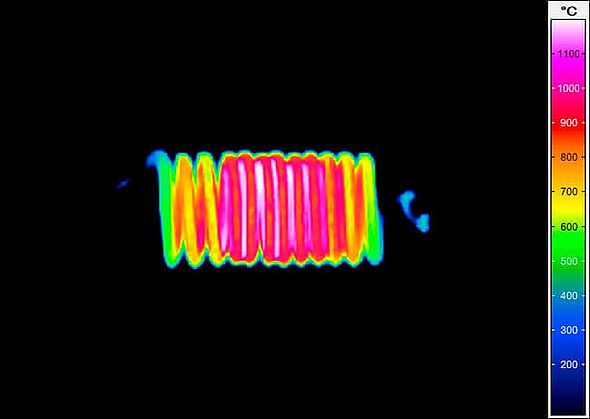
Emissivity values of materials greatly vary throughout the infrared spectrum. Concentrating the thermographic measurements on spectral ranges with an explicitly high or low emissivity can lead to detection of special effects. When spectral filters will be placed in infrared camera systems which only will allow radiation to come through from ranges with high emissivity disturbing background radiation can be minimised.
This method can be used for flame measurements. Thereby temperatures behind the flame will not affect the measurements – neither upwards nor downwards. The same procedure can reduce the effect of the background radiation when measuring thin plastic foils to really measure the foil temperature itself.
Measurement of Ranges with High Transmission
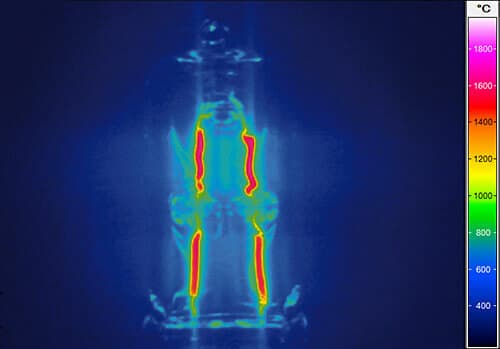
Concentrating on spectral ranges at which the transmission of the material is especially high allow for doing thermographic measurements of objects behind the material. The filament of a lamp can be measured without being influenced by the manifold colder glass of the lamp. The same holds true measuring objects behind flames.
Wide Range of Spectral Filters for Mounting Close to the Detector

The infrared camera systems of the ImageIR ® series cameras provide facilities for a mounting close to the detector within a filter wheel or a filter slider. The filter wheel of the ImageIR ® models is especially convenient as filters can be changed remotely controlled and motorised. Warm aperture effects caused by a filter position in front of the lens and resulting in possibly big measurement errors can be avoided by such positioning close to the detector being possible in infrared camera systems of InfraTec.



